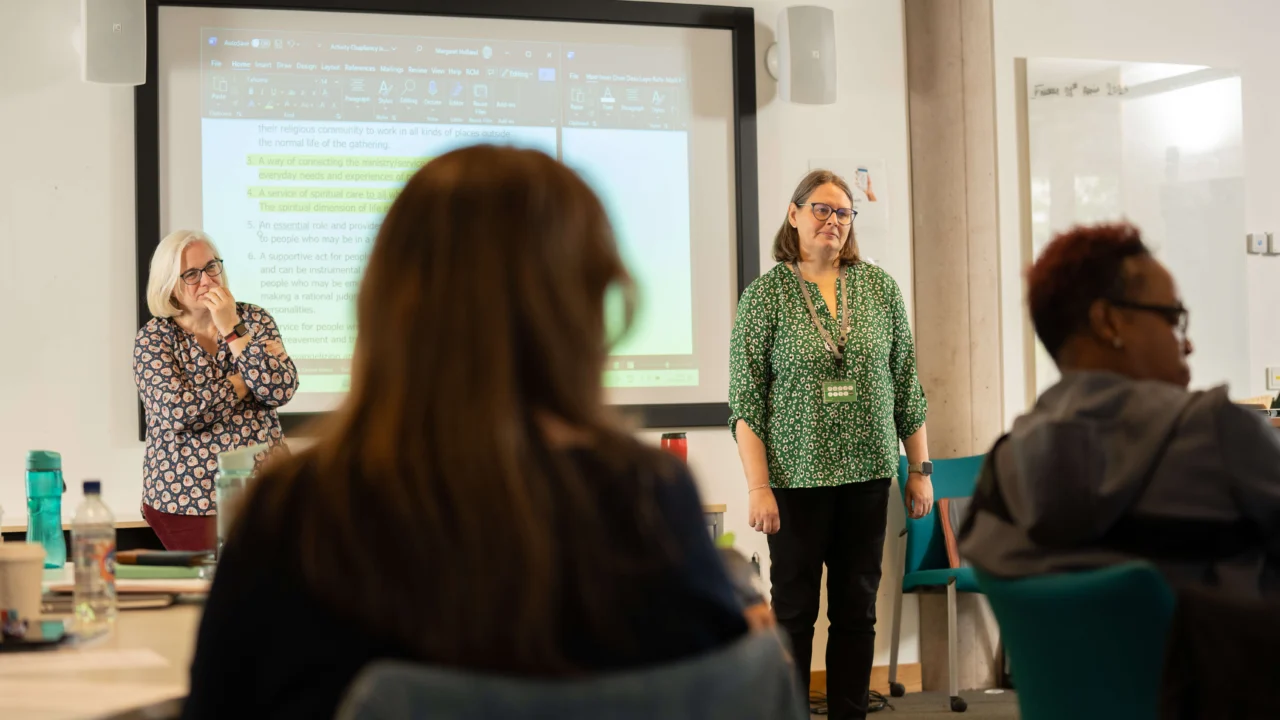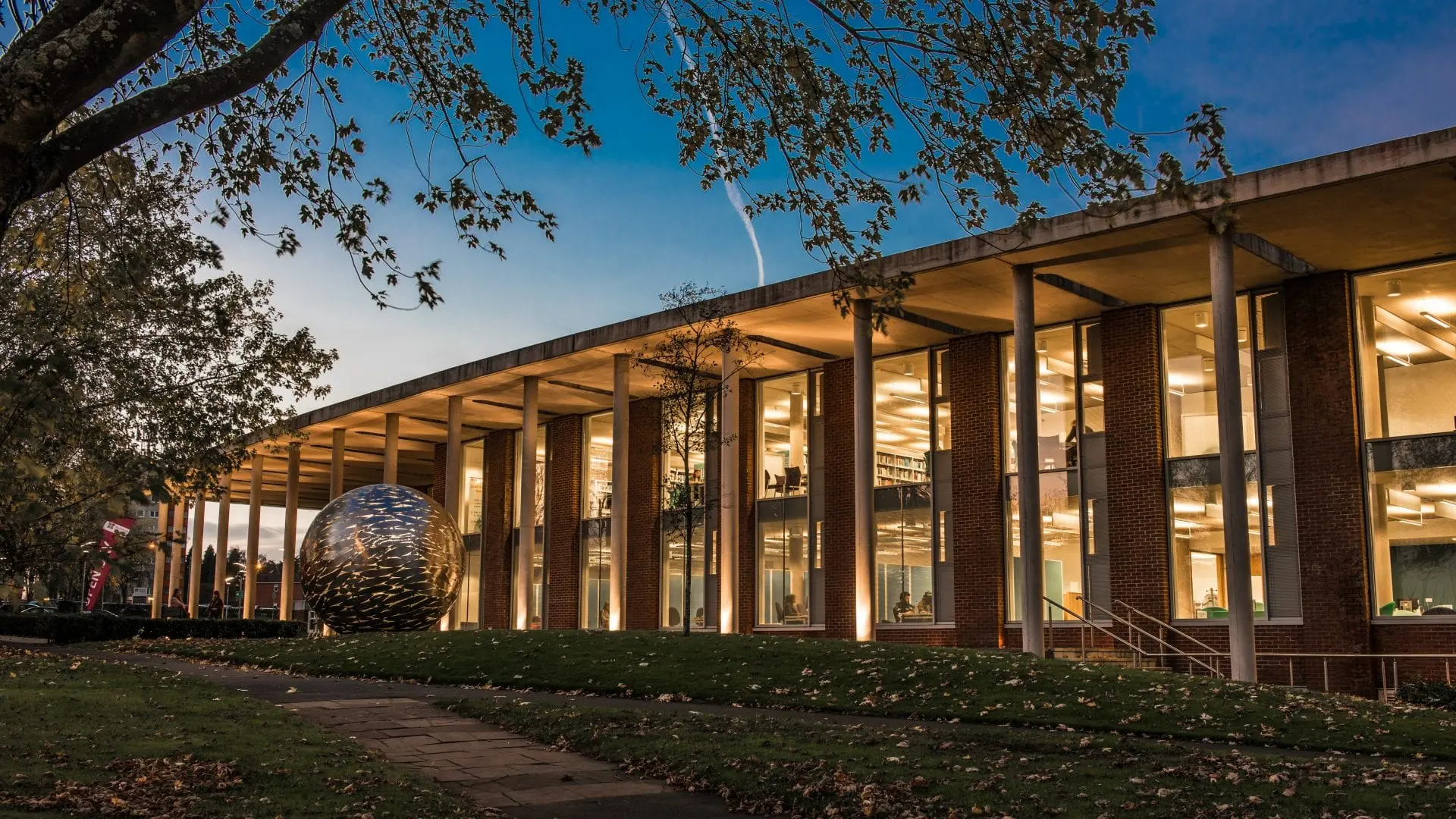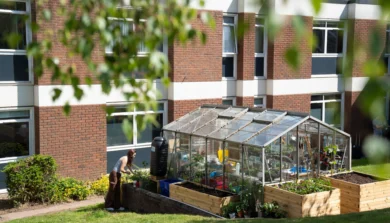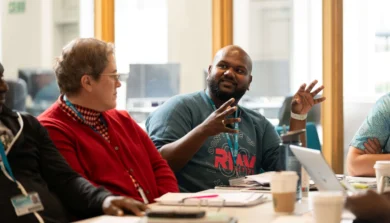MA Chaplaincy (part-time)
Postgraduate
- Start date
- –
- Study mode
- –
- Course length
- –
- UCAS Code
- –

Interested in a different start date?
Discover how reflective practice, applied knowledge and deep self-awareness prepare you to support others through chaplaincy in today’s diverse world. The MA in Chaplaincy at Birmingham Newman University is a flexible, part-time, work-based programme designed for those actively engaged in chaplaincy across a range of settings, including healthcare, education, prisons, the military and urban settings. Rooted in reflective and pastoral development, the course draws on interdisciplinary learning from a range of academic fields including sociology, psychology, philosophy and, where relevant, theology. You will benefit from experiential learning, applied research and reflective practice that connect academic theory with real-world chaplaincy. We welcome individuals from all faith and belief backgrounds. With weekend campus sessions and online support, the programme is structured to suit working professionals while encouraging personal and vocational growth. From your first day, you’ll be part of a university community that values empathy, integrity and development.
Why Study This Course?
Studying the Chaplaincy MA at Birmingham Newman University offers a rich and adaptable learning experience built around your professional context. The course encourages reflexive learning by combining academic theory with your lived experience, drawing on a range of disciplines that include sociology, psychology, philosophy and theology. With flexible entry points and specialist routes for those with prior qualifications, the programme is accessible to a wide range of chaplaincy professionals. Whether you are new to the field or seeking to deepen your practice, this course supports your development with confidence and care.
‘This course is designed to support your professional and personal development as a chaplain. Rooted in your own context, it recognises that you are, or will become, a key spiritual and pastoral presence in your setting. Through a blend of academic study and reflective practice, you’ll explore your role, deepen your self-awareness and grow in confidence as you develop your chaplaincy. Whether you're working in healthcare, education, prisons or community settings, this MA equips you with the tools to navigate complex ethical challenges, engage across faith traditions and offer emotional and spiritual support.’ – Helen Bardy, Senior Lecturer, Programme Lead Chaplaincy.
Explore the Depth and Diversity of Chaplaincy
Chaplaincy is shaped by interdisciplinary depth and practical insight, and this course invites you to explore both through a reflective and enriching learning experience. You will engage with philosophical, sociological and pastoral topics, integrating theory and practice to support your spiritual development. Each year builds on the last, offering opportunities to apply reflective practice and develop compassionate service. You’ll explore areas such as spiritual care, humanness, interfaith engagement and the role of chaplaincy in your specific context, whether in schools, healthcare, prisons or other settings. Through sessions, assignments and practical engagement, you will develop the insight and skills needed to support others with empathy, understanding and professional integrity.
Supportive and Professional Learning
At Birmingham Newman University, you will join a welcoming and inclusive learning community that values authenticity, collaboration and personal growth. The course is taught by experienced chaplains and academics who understand the realities of chaplaincy and are committed to your development. With interactive group teaching, one-to-one guidance and a strong emphasis on reflective learning, the programme is both academically challenging and personally rewarding. You will be supported every step of the way as you grow in confidence and capability.

Got a question you’d like to ask?
Entry requirements
We welcome students from all backgrounds and accept a wide range of qualifications. If yours aren’t listed, don’t worry – our Admissions Team can help you explore your options. See full entry requirements.
A relevant honours degree, 2:2 or above.
You will normally need to be working as a chaplain or similar in a paid or voluntary capacity for the equivalent of 2 sessions a week for each of the modules. One of your referees will need to be a person with direct experience of your practice, ideally also a chaplain. We will discuss your experience at interview.
All applicants will be interviewed in person or by video, you will have the opportunity to ask questions and meet one of the teaching team.
If English is not your first language, you must have an IELTS score of 6.5, with no element below 6.0. (Other English language qualifications are also accepted. Please contact admissions for further information).
Consideration will be given to applicants with lower grade in qualifications (e.g. a 3rd class degree or non-honours degree) who have a relevant range of post study professional experience. Professional experience will be considered by the programme leader in conjunction with the quality office on an individual basis.
Please contact Admissions if you have any questions.
Course fees
The tuition fee for academic year 2026/27 is: £5,125. Tuition fees for courses starting April to May 2026, fall within the 2025/26 academic cycle.
Fees for the 2025/26 academic year can be found on our Student Finance pages.
Additional costs
The University will review tuition fees and increase fees in line with any inflationary uplift as determined by the UK Government, if permitted by law or government policy, in subsequent years of your course. It is anticipated that such increases would be linked to RPI (the Retail Price Index excluding mortgage interest payments).
Check out our blog/news/events

Birmingham Newman Celebrates Green Week 2026 with Campus‑Wide Events
Birmingham Newman will host its annual Green Week from 23 to 27 February 2026, bringing…

Research that makes a difference: Mark Holland wins Most Impactful Project Award
In December, we held our Staff Awards, where we recognised the outstanding achievements of colleagues…

Sports Coaching students Deliver Coaching Sessions for Local Primary Pupils
Birmingham Newman University recently welcomed pupils from St Peter’s Primary School to campus as part…

Vice-Chancellor Professor Jackie Dunne awarded MBE in New Year Honours
Vice-Chancellor of Birmingham Newman University receives an MBE for services to Higher Education.

Birmingham Newman University Celebrates Staff Achievements at Annual Awards
Birmingham Newman University celebrates its staff at the Annual Staff Awards Celebration.

Book an open day
Find out about our next open day. Book now to secure your place.
Placement Information
Throughout your MA in Chaplaincy, you will engage in practical chaplaincy work within your own professional or voluntary setting (at least two sessions per week). Working within your chaplaincy context allows you to interact with individuals and communities across a range of sectors, helping you to build insight, confidence and a deeper understanding of inclusive spiritual and pastoral care. These experiences are carefully integrated with your academic modules to support your development. You will be guided by experienced professionals and supported by university staff, and through structured reflection and assessment. These opportunities are designed to help you apply theory to real-life scenarios and grow into a capable and reflective Chaplain.

What Careers Can I Consider
Graduates of the Chaplaincy MA are well-prepared for senior chaplaincy roles, leadership positions or further academic study. Birmingham Newman University’s Careers and Employability Service offer tailored support through mentoring, expert guidance and access to resources that help you plan your next steps. Many graduates continue in chaplaincy, progressing into leadership or transitioning from voluntary to paid roles, making a positive contribution to the community.
Accreditations and Exemptions
This degree is academically challenging and professionally relevant, and Year 1 is currently being considered for recognition by the UK Board of Healthcare Chaplaincy, preparing you for roles that require ethical awareness, reflective practice and, where appropriate, theological insight. The Chaplaincy MA is a fully accredited postgraduate qualification awarded by Birmingham Newman University and recognised across sectors including education, healthcare, prisons and pastoral ministry. It also provides a strong foundation for further academic research or doctoral study. Students who have completed the Postgraduate Certificate in Chaplaincy or Paediatric and Maternity Chaplaincy at Birmingham Newman University may use their credits toward the MA and typically enter Year 2, provided it is within five years of completion.
Courses we think you'll also like

Postgraduate Certificate in Chaplaincy (part-time)
- Start date:
- September 2026

PGCE Secondary Religious Education with recommendation for QTS (part-time)
- Start date:
- September 2026

PGCE Secondary Physics (part-time)
- Start date:
- September 2026

PGCE Secondary Physical Education (part-time)
- Start date:
- September 2026
